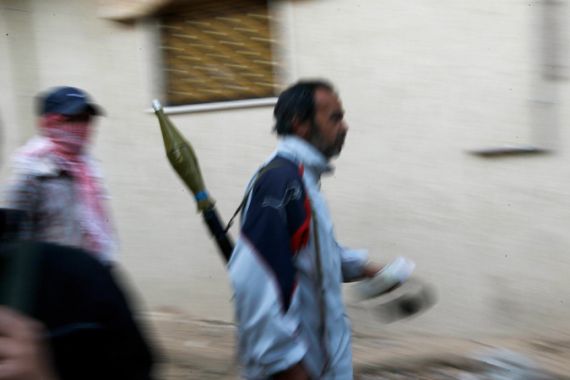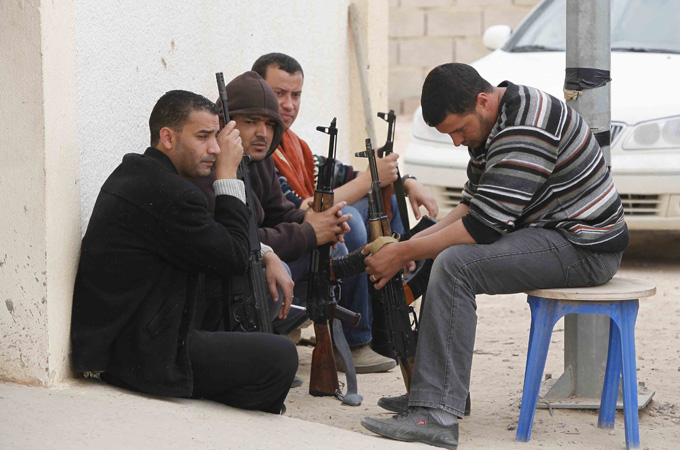Radio Free Libya transmits live from Misurata
Despite death threats and bombs, Radio Free Libya continues its rebel broadcasts in support of the revolution.

 |
| Radio Free Libya Misrata broadcasts live on the movements of the rebels at the frontlines of the revolution [EPA] |
For residents of besieged Misrata, all it takes is a flick of the dial to tune into freedom.
Broadcasting revolutionary songs, news, and debate, Radio Free Libya Misrata is a bastion of the rebellion against Muammar Gaddafi’s regime. The rebel broadcasts act as a unifying force for the war-torn city. As residents drive through the sandbag checkpoints, past bullet-riddled homes and devastated buildings, the programs remind them of their cause: forcing Gaddafi from power.
Radio Misrata, as it used to be called, had been an ordinary local station, enslaved to the whims of Gaddafi’s rules of broadcast. Dissenting voices were banned from the airwaves, and the content was strictly controlled.
The moment the rebels seized the frequency on February 21, every aspect of the regime’s forty-two years of control was diligently erased.
‘Good Morning Libya’
“During the Gaddafi period, most nationalistic songs had Gaddafi’s name in them. We searched through dozens to play a tune that only mentions the land,” says founder Ahmed Hadia.
“Good Morning Libya” – the radio’s flagship show, features news on the latest front line fighting, interviews with rebel council members, and the availability of food, water and other city logistics.
Other programs focus on keeping up morale. “The Protectors” focuses on and praises the work of volunteers around the city. The religious programs preach the need for patience, and the rewards to come.
“We started with this to raise the national feeling of the people,” says Hadia.
It is also used as a propaganda tool aimed at Gaddafi supporters; running calls for them to join the other side.
“Who controls the media, controls the country. If the radio waves had gone silent [when Gaddafi was pushed out of Misrata], it would have given the impression that there was no control,” explains Hadia.
Initially the rebels had no trouble finding presenters – teachers, clerics, academics; all people with no previous radio experience committed themselves to the cause, producing a flurry of unprecedented programs. After decades of biting their tongues, the radio was inundated with callers desperate to speak their mind.
“They wanted to express how happy they were that the city had become free, and to convey how much they hate Gaddafi and the dictatorship,” says Salim Betmal, a Leeds University-educated lecturer turned DJ.
“We even had a few Gaddafi supporters ring in to threaten the radio and other callers,” says Betmal. “We let them speak on air without censorship.”
However, the dissenting voices symbolized a defiance that quickly became an object of fury for Gaddafi.
Gaddafi’s forces react
Regime jets tried to bomb the station twice before the NATO no-fly zone was implemented. The building stood riddled with bullets from heavy machine gun fire, and parts of the walls crumbled from the impact of a rocket propelled grenade.
Despite all this, Hadia remains steadfast: “This is our land, it is part of us, we have to defend it – even if we pay with our bodies.”
Loyalists still inside the rebel town tried to destroy the stations antenna with explosives. Worse, hit men were hired to assassinate the staff.
“The checkpoint guards caught a man armed with a gun, and 3500 Libyan dinar [almost $3,000 USD]. He later confessed that he had been sent to kill Ahmed Hadia,” says Betmal.
Some of the radio’s staff cut new entrances to the building in order to evade the sniper fire trained on the door. For security reasons, they decided to relocate their offices twice to new buildings.
The attacks scared many of the presenters away, but the radio’s founders continued undeterred. An engineer added an AM channel alongside the FM signal so that the station can be heard, on clear days, in places as far away as Europe.
Today, the radio station continues to expand. Free Libya correspondents are being dispatched on the ground to gather news from the local front lines. The fear-fuelled rumour mills produced in warfare can only be abated with boots on the ground, and the rebel news programs say they want to be accurate.
“Sometimes we choose uplifting news, but we never tell a lie. Either tell it straight, or don’t tell it,” says Betmal.